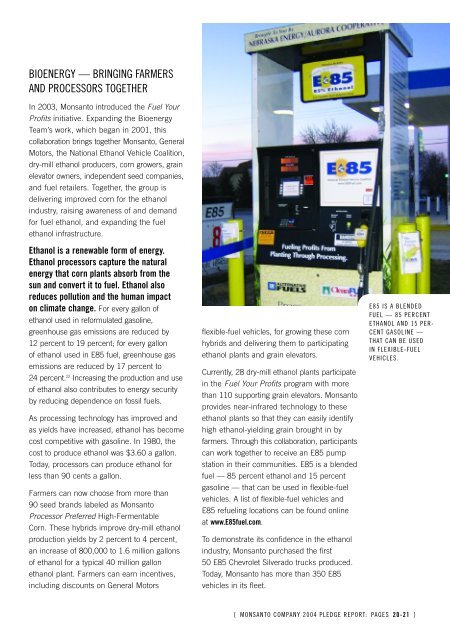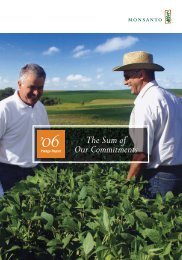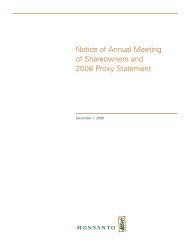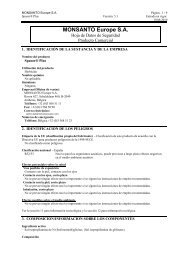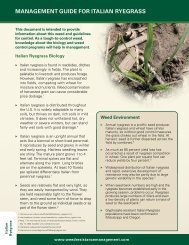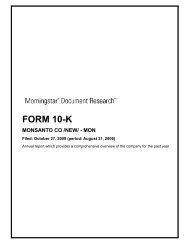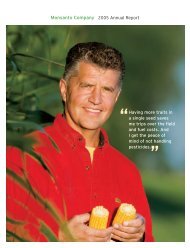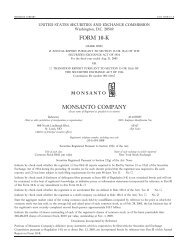You also want an ePaper? Increase the reach of your titles
YUMPU automatically turns print PDFs into web optimized ePapers that Google loves.
BIOENERGY — BRINGING FARMERS<br />
AND PROCESSORS TOGETHER<br />
In 2003, <strong>Monsanto</strong> introduced the Fuel Your<br />
Profits initiative. Expanding the Bioenergy<br />
Team’s work, which began in 2001, this<br />
collaboration brings together <strong>Monsanto</strong>, General<br />
Motors, the National Ethanol Vehicle Coalition,<br />
dry-mill ethanol producers, corn growers, grain<br />
elevator owners, independent seed companies,<br />
and fuel retailers. Together, the group is<br />
delivering improved corn for the ethanol<br />
industry, raising awareness of and demand<br />
for fuel ethanol, and expanding the fuel<br />
ethanol infrastructure.<br />
Ethanol is a renewable form of energy.<br />
Ethanol processors capture the natural<br />
energy that corn plants absorb from the<br />
sun and convert it to fuel. Ethanol also<br />
reduces pollution and the human impact<br />
on climate change. For every gallon of<br />
ethanol used in reformulated gasoline,<br />
greenhouse gas emissions are reduced by<br />
12 percent to 19 percent; for every gallon<br />
of ethanol used in E85 fuel, greenhouse gas<br />
emissions are reduced by 17 percent to<br />
24 percent. 22 Increasing the production and use<br />
of ethanol also contributes to energy security<br />
by reducing dependence on fossil fuels.<br />
As processing technology has improved and<br />
as yields have increased, ethanol has become<br />
cost competitive with gasoline. In 1980, the<br />
cost to produce ethanol was $3.60 a gallon.<br />
Today, processors can produce ethanol for<br />
less than 90 cents a gallon.<br />
Farmers can now choose from more than<br />
90 seed brands labeled as <strong>Monsanto</strong><br />
Processor Preferred High-Fermentable<br />
Corn. These hybrids improve dry-mill ethanol<br />
production yields by 2 percent to 4 percent,<br />
an increase of 800,000 to 1.6 million gallons<br />
of ethanol for a typical 40 million gallon<br />
ethanol plant. Farmers can earn incentives,<br />
including discounts on General Motors<br />
flexible-fuel vehicles, for growing these corn<br />
hybrids and delivering them to participating<br />
ethanol plants and grain elevators.<br />
Currently, 28 dry-mill ethanol plants participate<br />
in the Fuel Your Profits program with more<br />
than 110 supporting grain elevators. <strong>Monsanto</strong><br />
provides near-infrared technology to these<br />
ethanol plants so that they can easily identify<br />
high ethanol-yielding grain brought in by<br />
farmers. Through this collaboration, participants<br />
can work together to receive an E85 pump<br />
station in their communities. E85 is a blended<br />
fuel — 85 percent ethanol and 15 percent<br />
gasoline — that can be used in flexible-fuel<br />
vehicles. A list of flexible-fuel vehicles and<br />
E85 refueling locations can be found online<br />
at www.E85fuel.com.<br />
To demonstrate its confidence in the ethanol<br />
industry, <strong>Monsanto</strong> purchased the first<br />
50 E85 Chevrolet Silverado trucks produced.<br />
Today, <strong>Monsanto</strong> has more than 350 E85<br />
vehicles in its fleet.<br />
E85 IS A BLENDED<br />
FUEL — 85 PERCENT<br />
ETHANOL AND 15 PER-<br />
CENT GASOLINE —<br />
THAT CAN BE USED<br />
IN FLEXIBLE-FUEL<br />
VEHICLES.<br />
{ MONSANTO COMPANY 2004 PLEDGE REPORT: PAGES 20-21 }


